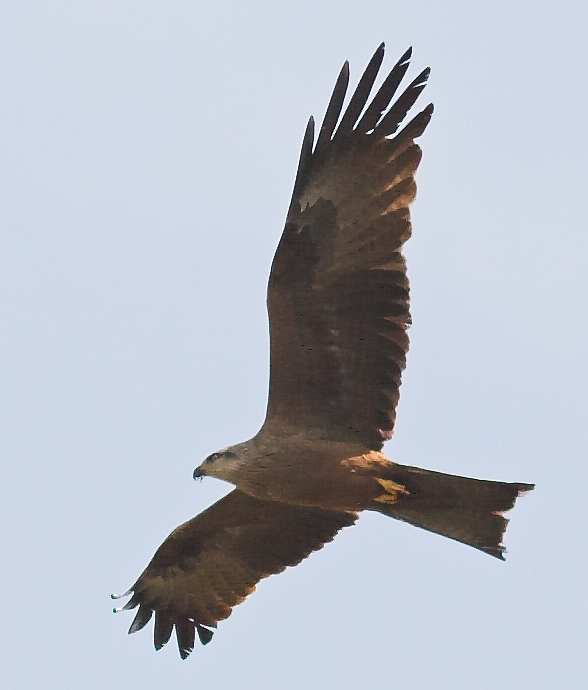Black Kite
From Wikipedia, the free encyclopedia
[Photo] Beschreibung: Schwarzmilan (Milvus migrans). Quelle: selbst fotografiert am 19. Juni 2005. Fotograf: Ferdinand Grassmann http://de.wikipedia.org/wiki/Benutzer:Fgrassmann
The Black Kite (Milvus migrans) is a medium-sized bird of prey in the family Accipitridae which also includes many other diurnal raptors such as eagles, buzzards, and harriers.
This kite is a widespread species throughout the temperate and tropical parts of Eurasia and parts of Australasia. Curiously, it is not found in the Indonesian archipelago between the South East Asian mainland and the Wallace Line.
European and central Asian birds (subspecies M. m. milvus and M. m. lineatus respectively) are migratory, moving to the tropics in winter, but races in warmer regions such as the Indian M. m. govinda ( Pariah Kite) or the Australasian M. m. affinis (Fork-tailed Kite), are resident.
In the northern winter, it is therefore common to have a resident race and a distinguishable migrant form present together in these hotter areas.
In the United Kingdom, the Black Kite occurs only as a wanderer on migration. These birds are usually of the nominate race, but in November 2006 a juvenile of the eastern lineatus, not previously recorded in western Europe, was found in Lincolnshire.
Black Kites will take small live prey as well as fish, household refuse and carrion. They are well adapted to living in cities and are found even in densely populated areas. They are attracted to fires and smoke where they seek escaping insect prey. Large numbers may be seen soaring in thermals over cities. In some places they will readily swoop to take to food offered by humans, their habit of swooping to pick up dead rodents from roads often leads to them being hit by vehicles. They are also a major nuisance at some airports where they are considered important birdstrike hazards.
The Black Kite can be distinguished from the Red Kite by its slightly smaller size, less forked tail and generally dark plumage without any rufous.
The Black Kite nests in forest trees, often close to other kites. In winter, many kites will roost together.
Systematics
The Red Kite has been known to successfully hybridize with the Black Kite (in captivity where both species were kept together, and in the wild on the Cape Verde Islands).
Recent DNA studies suggest that the yellow-billed African races of Black Kite, M. m. parasitus and M. m. aegyptius differ significantly from Black Kites in the Eurasian clade, and should be considered as a separate, allopatric species Yellow-billed Kite, M. aegyptius.[1] They occur throughout all of Africa except the Congo basin and the Sahara Desert.
On the other hand, the same study suggests that the Black-eared Kite (M. m. lineatus), sometimes separated as M. lineatus, is not sufficiently distinctive to justify specific status. As molecular information is much more reliable in this species than in the Red Kite [2], the Black-eared Kite should be regarded a distinct allopatric subspecies.
Subspecies
Milvus migrans migrans (Boddaert, 1783): European Black Kite
Breeds C, S and E Europe to Tien Shan and south to NW Pakistan. Winters in sub-Saharan Africa.
Milvus migrans lineatus (J. E. Gray, 1831): Black-eared Kite
Siberia to Amurland S around Himalaya to N India, N Indochina and S China; Japan. Northern inland birds migrate to E Persian Gulf coast and S Asia in winter.
Milvus migrans govinda (Sykes, 1832): Pariah Kite
E Pakistan through tropical India and Sri Lanka to Indochina and Malaysian Peninsula. Resident.
Milvus migrans affinis (Gould, 1838): Fork-tailed Kite
Sulawesi and possibly Lesser Sunda Islands; Papua New Guinea except mountains; NE and E Australia.
Milvus migrans formosanus (Kuroda, 1920): Taiwan Kite
Taiwan and Hainan; resident.
http://en.wikipedia.org/wiki/Black_Kite
| The text in this page is based on the copyrighted Wikipedia article shown in above URL. It is used under the GNU Free Documentation License. You may redistribute it, verbatim or modified, providing that you comply with the terms of the GFDL. |
|

